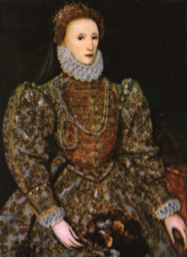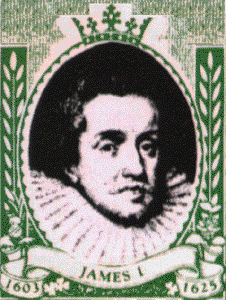The Lord Chamberlain's Men and the King's Men
Queen Elizabeth I |
In 1572 Elizabeth I's Ministers passed through Parliament the "Act for Punishment as Vagabonds"; this required all entertainers to obtain a noble patron who would vouch for their conduct as they travelled through the countryside. Acting was beginning the process of becoming a respectable profession. Permanent theatres and acting companies were soon to be established in London as profitable money-making ventures despite opposition from Puritans who objected to such idle diversions taking their workers from more productive labour. |
When the plague struck in the cities the theatres were closed and the acting companies had to find alternate sources of income. Often they would return to the nomadic life style which had been traditional for performers of all sorts. A good income could be earned by performing in the private homes of the nobility and in the Royal Court.
When James Burbage founded the acting company that Shakespeare was to join, he sought the patronage of Lord Hunsdon, the Lord Chamberlain. Hence the company came to be known as "The Lord Chamberlain's Men". Shakespeare, having already established his reputation as an actor and playwright, joined the company in 1594. When the Globe Theatre was opened in 1599 there were seven shareholders in "The Lord Chamberlain's Men". Cuthbert and Richard Burbage provided most of the capital for the new theatre and controlled a half interest in the company. Shakespeare, along with John Heminge, Augustine Phillips, Thomas Pope and William Kempe owned the other half of the shares. The names and numbers of "sharers" varied as the valuable shares in the partnership were sold with the consent of the other owners.
| Pressure from the authorities had reduced the number of adult acting companies in London to three by the spring of 1603. In May, those three "privileged companies" were granted patronage (and therefore protection) by members of the royal family. By decree of King James, the Lord Chamberlain's Men became "The King's Men". The shareholders in the company were given minor positions in the royal household as "Grooms of the Chamber." This honour signified the prominence of Shakespeare's acting company in the kingdom. |
(from a commemorative seal) |
Return to a brief biography of William Shakespeare
Return to General Information on Grose Educational Media

